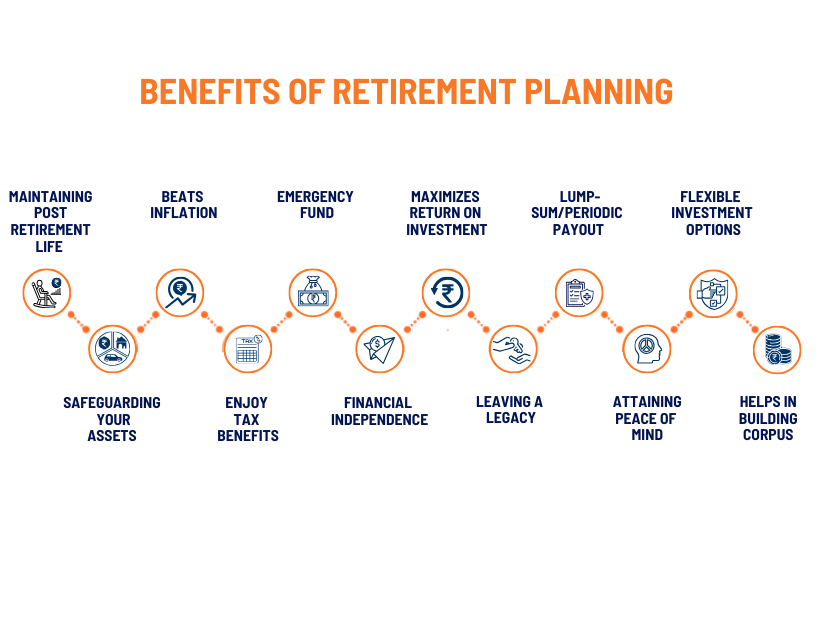Learn More About Retirement Plan
Retirement planning is a comprehensive and strategic approach that revolves around establishing specific financial objectives aimed at guaranteeing a retirement period marked by both comfort and financial security. This multifaceted process encompasses an evaluation of your existing financial circumstances, projecting anticipated future expenses, and crafting a tailored savings and investment strategy. The ultimate goal is to accumulate a corpus of funds that aligns with the financial demands of your retirement years, covering essential living costs, unforeseen contingencies, and desired lifestyle choices.
Employees' Provident Fund (EPF) : A mandatory savings scheme for salaried employees in India, where both the employee and employer contribute a percentage of the employee's salary. The EPF is designed to provide financial security in retirement.
Public Provident Fund (PPF) : A long-term savings scheme with a fixed interest rate, providing tax benefits. It is open to all Indian residents and is often used as a retirement savings tool.
National Pension System (NPS) : A voluntary, contributory pension system that allows individuals to create a retirement corpus. NPS offers various investment options and tax benefits.
Employee Pension Scheme (EPS) : Part of the EPF, this scheme provides a pension to employees who are members of the EPF after they reach a certain age or upon retirement.
Atal Pension Yojana (APY) : A government-backed pension scheme targeted at workers in the unorganized sector, providing fixed monthly pension payments based on contributions and age.
Shares & Stocks : They represent ownership in a company, with shares denoting individual units of ownership and stocks referring to the collective ownership of a company's shares. Investors buy shares or stocks to have a stake in a company's assets, profits, and decision-making, potentially benefiting from capital appreciation and dividends.
Mutual Funds : A mutual fund is a professionally managed investment vehicle that pools money from multiple investors to purchase a diversified portfolio of stocks, bonds, or other securities, providing investors with a way to access a diversified and professionally managed investment portfolio.
Savings Plan : It is a systematic approach to setting aside a portion of income to achieve financial goals and build a financial cushion.
Guaranteed Income Plans : They are insurance policies that offer policyholders a fixed, assured tax-free income at regular intervals, ensuring financial stability and security.
ULIP’s : Unit Linked Insurance Plans are investment-cum-insurance products that combine life insurance coverage with the opportunity to invest in a variety of funds, offering potential returns linked to market performance.
Bank Fixed Deposits (FD’s) : It is a financial investment where a sum of money is deposited with a bank or financial institution for a specified period at a fixed interest rate, offering a predictable return at maturity.
Bonds : Investment bonds are debt securities issued by governments or corporations to raise capital, with investors lending money in exchange for periodic interest payments and the return of the bond's face value at maturity.
Post Office Monthly Income Scheme (POMIS) : A fixed-income savings scheme offered by India Post that provides regular monthly income.
Immediate Annuity Plans : Insurance companies offer annuity plans where a lump sum amount is invested to receive regular payouts immediately or after a deferred period, ensuring a steady income stream during retirement.
Real Estate : Investment in real estate refers to the acquisition of properties or real estate-related assets with the aim of generating rental income, potential capital appreciation, and diversifying one's investment portfolio, often seen as a long-term strategy for wealth accumulation.
Disclaimer : Before making any investment decisions or retirement planning choices, it is crucial to consult with qualified financial advisors or tax professionals. They can assess your unique situation and provide personalized recommendations tailored to your financial goals, risk tolerance, and timeline. All investments carry inherent risks, including the potential loss of principal. It's essential to conduct thorough research, understand the terms and conditions of investment products, and carefully assess your own financial situation before committing to any investment.




